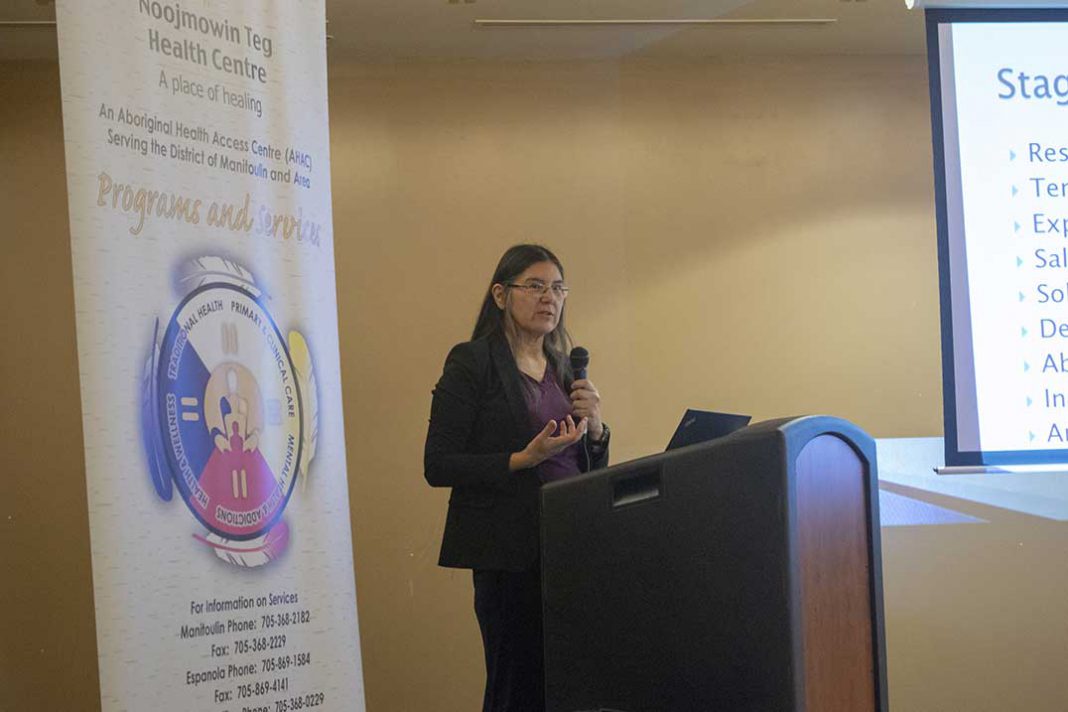LITTLE CURRENT – Researchers in several disciplines convened at the Manitoulin Hotel and Conference Centre in the late winter to discuss highlights of their research and share perspectives on their experiences and challenges in completing the work, while addressing the issue of how research can contribute to reconciliation between Indigenous and non-Indigenous communities.
“This is the third research conference on Manitoulin Island,” said Lorilee McGregor, the chair of the Manitoulin Anishinaabek Research Review Committee (MARRC), in her opening address.
MARRC started in 2001. In that time, more than 60 research projects have passed through the committee. The people behind those projects were invited to share their findings with community members at this event.
“For a long time, our communities had mostly negative experiences with health research and so the committee was established as a way to ensure that research happening on Manitoulin was ethical, from an Indigenous perspective,” said Ms. McGregor.
The focus of the presentations was on research projects that have taken place in the past five years. The event was open to any interested persons, whether they were a community member who was interested in the results or just someone who wanted to see examples of the cutting-edge Indigenous research taking place on the Island.
Leona Nahwegahbow led an opening prayer on the first day of the conference and the attendees also smudged. Ryan Corbiere offered some introductory statements on behalf of Noojmowin Teg, whose board he chairs. Then Ms. McGregor welcomed the room with an overview of MARRC.
“In 2001, Noojmowin Teg sponsored a research conference at the Ojibwe Cultural Foundation. We brainstormed what makes research ethical from an Indigenous perspective,” she said.
From there, representatives from Island health centres and other organizations formed a working committee and developed guidelines for ethical Indigenous health research. Since then, the committee has begun to explore all types of research beyond the health field, including educational, environmental, social and economic research.
A key aspect that the group strives to maintain is the importance of the host community for any research project. Through their review process, they assess how community members will be involved and how they will be benefited as a result of supporting a research project. They also assess how fundamental guidelines like the Seven Grandfather Teachings will be followed in each project.
Deborah McGregor had the next speaking role. She was the morning’s keynote speaker and gave an hour-long presentation about the future directions of Indigenous research. She has taught an Indigenous Research Methods course for 12 years and joked that this presentation was essentially condensing a semester-long course into one hour.
“A lot of past research has essentially boiled down to, ‘First Nations have alcohol problems.’ They think we’re the problem and there’s been a lot of research about solving ‘the problem’,” said Ms. McGregor.
“Past research has often been done by non-Indigenous people, giving Indigenous peoples little to no opportunity to provide feedback, offer corrections and combat racism,” she said. “There’s been billions put into solving the ‘Indian problem,’ and I wonder what would have happened if that money was put into the communities.”
She continued to say that former research has often treated Indigenous peoples as one homogeneous group, rather than the diverse and nuanced collection of peoples with their own unique customs, values and beliefs.
“People are calling it Indigenous research now, but it should eventually be Anishinaabek research, Cree research or Métis research,” she said, adding that an important first step is following communication protocol within Indigenous communities and recognizing elders as knowledge holders.
“We had our own ways of scholarship (traditionally). Research did not start with colonization,” she said, then led into several of the major periods of Indigenous research and said that the research mentality needs to shift from studying Indigenous peoples to researching with Indigenous peoples.
This was all not to say that she thought research should be conducted by Indigenous people only; rather, she said a respect for their language, metaphors and symbols is needed in order to be effective and respectful, along with trauma-informed research to avoid re-traumatizing individuals who have lived through challenging experiences.
She also said that Anishinaabek need to determine what reconciliation means to them and that they should make that known to researchers. That way, they will be able to work towards an acceptable standard.
Following a short break, Rob Wabegijig and Mark Forsyth presented their survey findings as part of the Manitoulin Drug Strategy. The survey, whose results have previously appeared in this newspaper, found that 90.7 percent of people have been directly impacted by drug or alcohol addiction, whether in themselves or in a close friend or family member.
The survey also found that while the respondents overwhelmingly knew where to obtain substances like alcohol, cannabis, cocaine and crack cocaine, among other narcotics, they did not know as much about the support services for Island residents living with addictions. Manitoulin Drug Strategy is now developing a work plan to address the concerns found through the survey, find alternate service providers and advocate for change.
Susan Snelling and Danielle Bourgault then presented their experiences in running three-day-long digital storytelling workshops with Zhibaahaasing youth as a way of promoting health and identifying community challenges. They discussed some of the merits and challenges with this approach and then showed some examples of work the children had produced.
Following those two presentations, there was a discussion in the groups seated together about their research experiences on the Island and a question of what could be done to improve how research is conducted involving Anishinaabek.
Chelsea Gabel and Nicole Goodman discussed findings related to online voting in First Nations elections, using Whitefish River First Nation as a case study. A majority of respondents expressed satisfaction with online voting, compared to a much less favourable review of paper voting. Digital voting also addresses concerns about off-reserve members participating in elections.
Further presentations throughout the afternoon were Mary Jo Wabuno and Nancy Young’s work in implementing the Aboriginal Children’s Health and Well-Being Measure in Wiikwemkoong schools, Leslie McGregor and the impacts of climate change in Whitefish River First Nation, an evaluation of the Northern Food and Vegetable Program by Chantel Belanger and Michele Lim, Sean Meades and Deb Pine’s investigation on the regional labour market for Indigenous language teachers, administrators and service providers and Carol Mayer’s findings from a cancer symptom management initiative.
The following day featured a keynote from Cindy Peltier about Indigenous research methods with participatory action research, Karen Pitawanakwat and Marion McGregor’s work on dementia and aging populations, Mark Bruner and Kieran Pelletier’s study of Indigenous youth development through sport and physical activity, Sheldon Tobe’s hypertension work, Marion Maar and Randy Trudeau’s study on Indigenous perspectives on domestic violence on an Island First Nation, Shelley Trudeau’s examination of social assistance and service delivery on a First Nation, Joshua Manitowabi’s study on incorporating Anishinaabe knowledge into the education curriculum and Melanie Manitowabi’s examination of integrating Anishinaabe culture into elementary school curriculum.
Small group discussions centered on offering advice to researchers wanting to do studies with Anishinaabek, good practices to share with other researchers, what ‘reconciliation’ means to each individual, how research has impacted Anishinaabek people and communities on Manitoulin, and the role of research in reconciliation.




